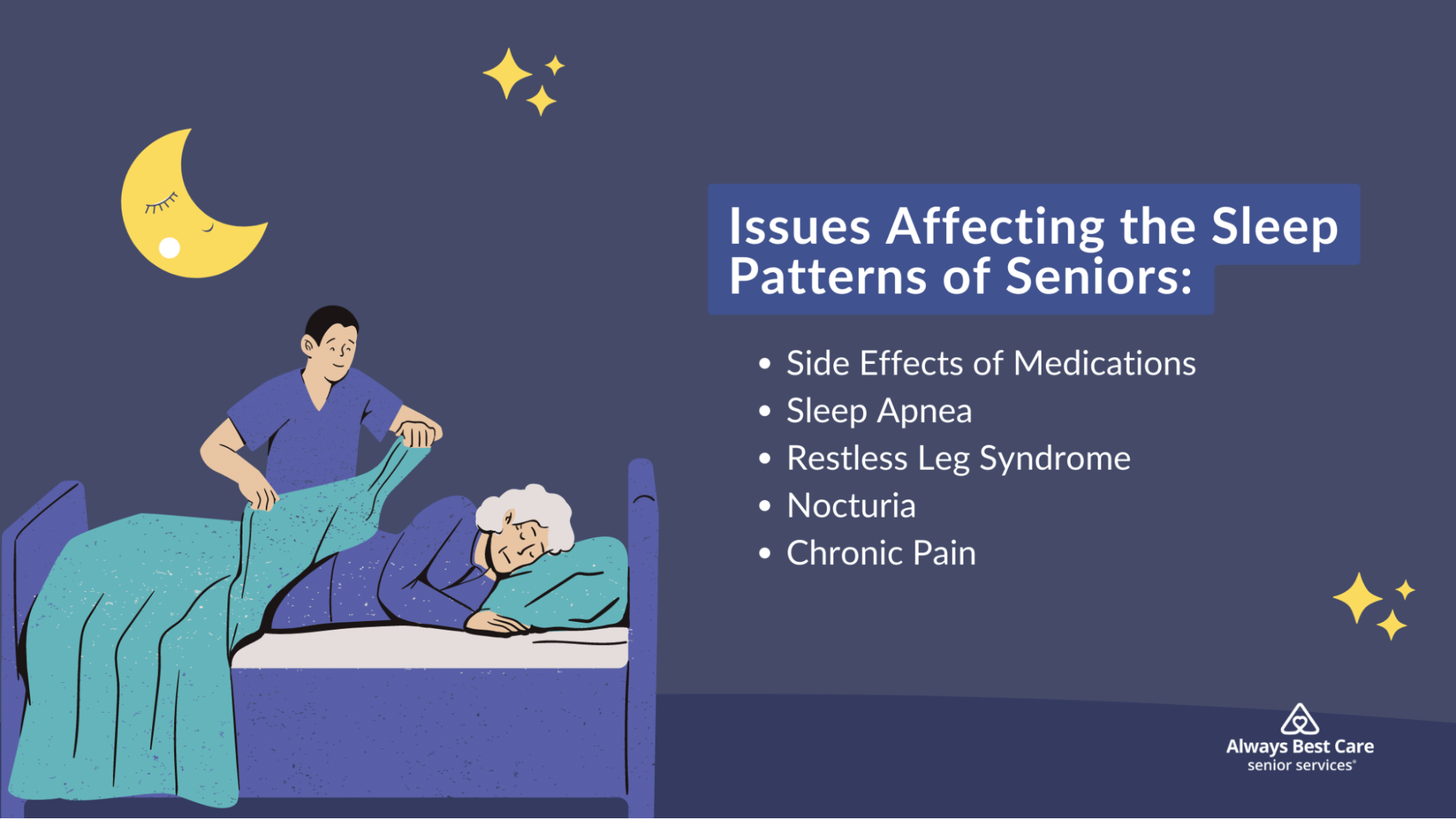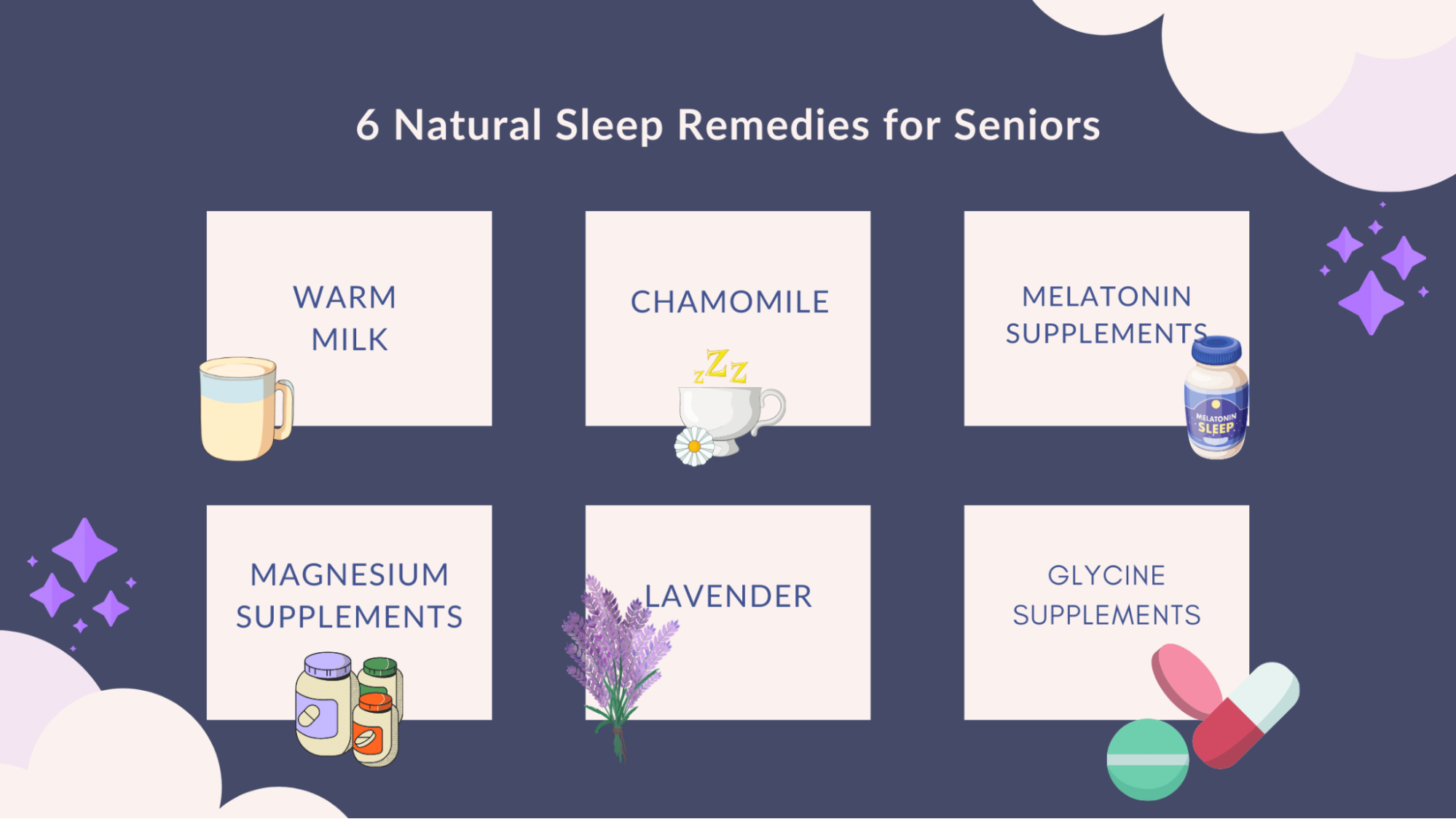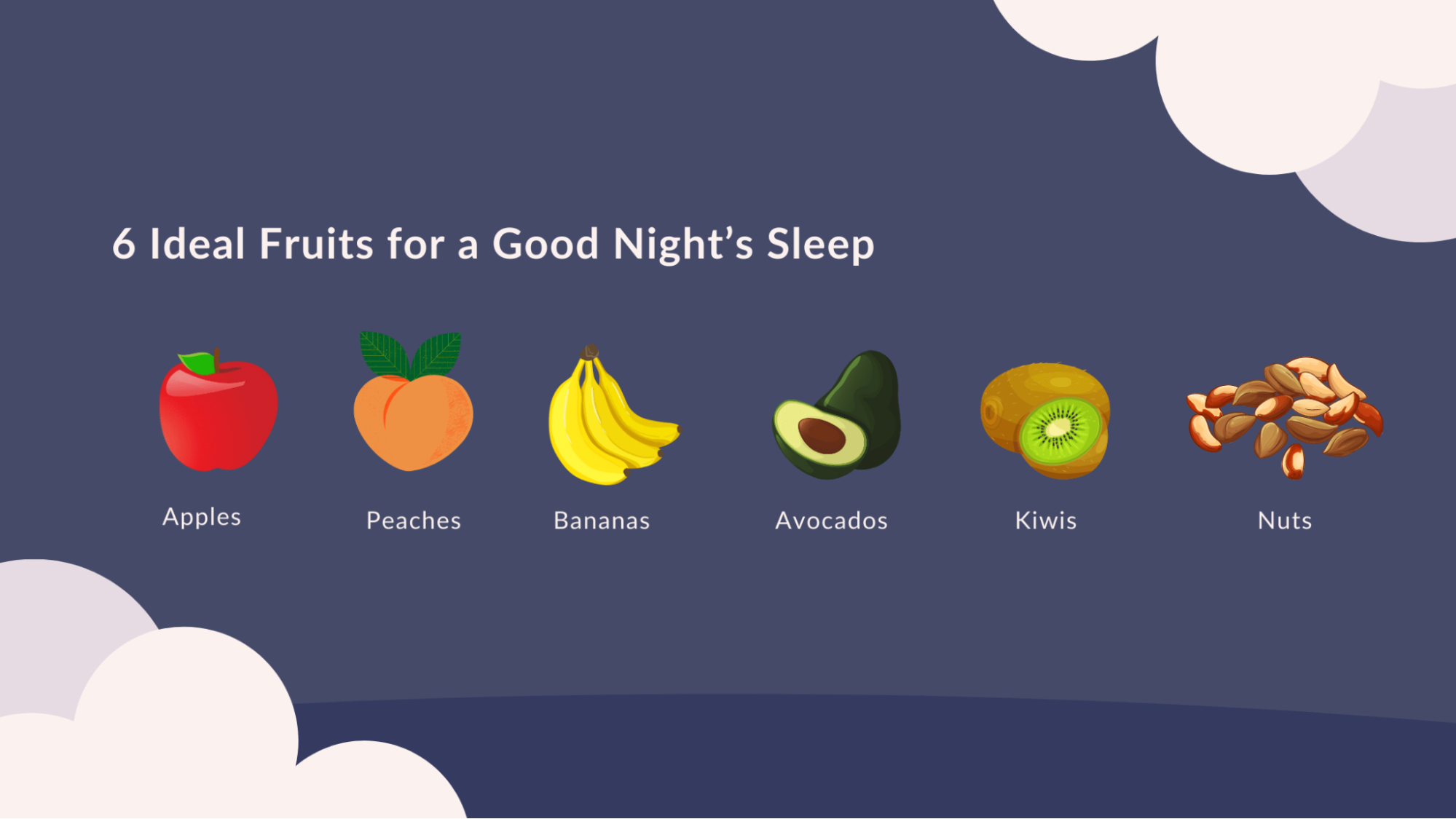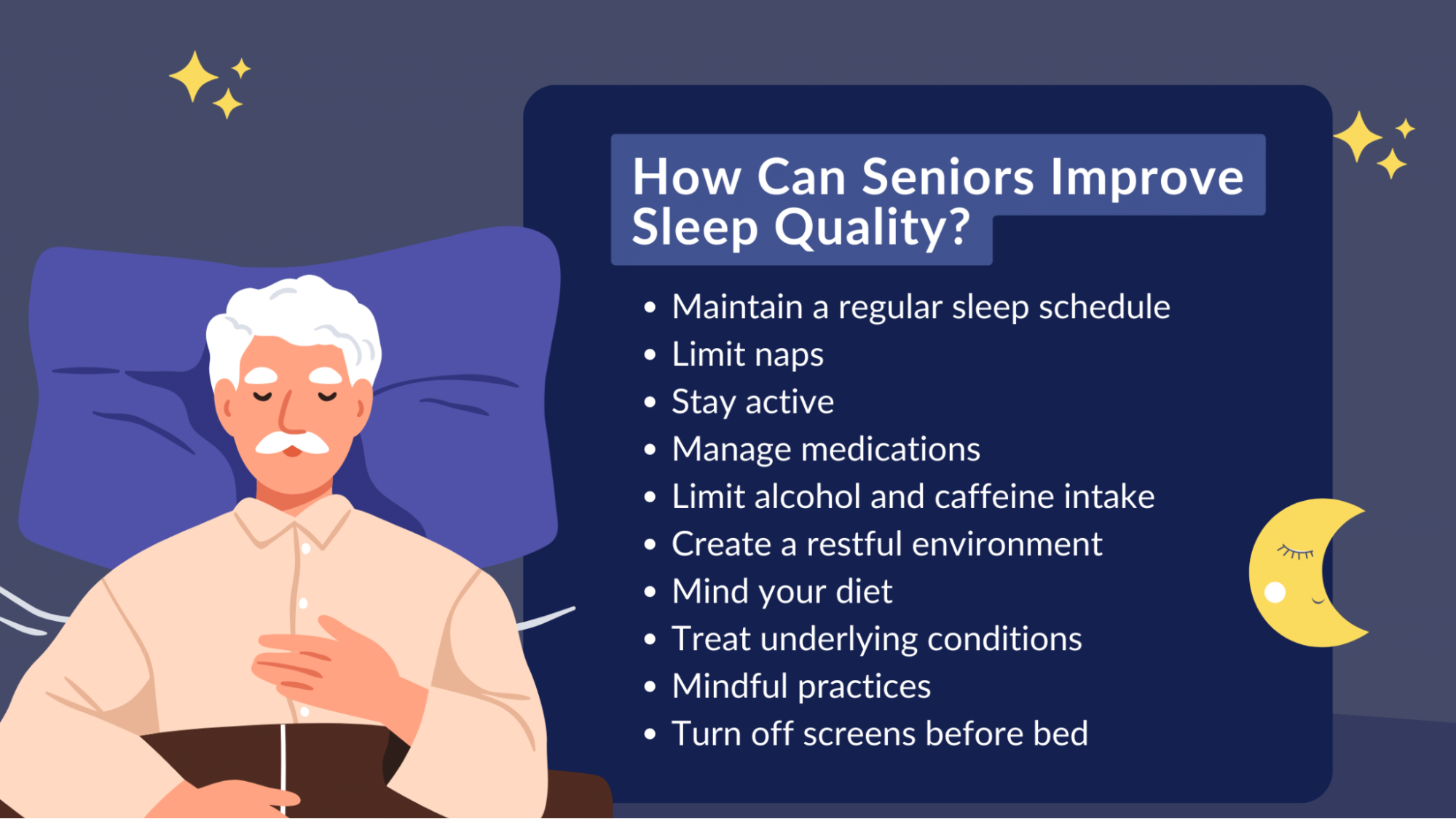Sleep Struggles? Natural Sleep Remedies for Seniors

In the golden years of life, a good night’s sleep can sometimes be elusive.
But it doesn’t always have to be so.
In this article, we’ll delve into natural sleep remedies that can help seniors combat sleepless nights.
From herbs to lifestyle changes, we’ve got a treasure trove of tips that can lead to better slumber!
Table of Contents
Why Do Older Adults Have Trouble Sleeping?

The natural aging process leads to changes in our sleep patterns. While restless sleep is an everyday part of aging, certain sleep disturbances are not, and they can seriously impact our seniors’ quality of life.
Let’s review the common reasons why older adults may have trouble sleeping:
Side Effects of Medications
Numerous older adults are on various medications for chronic health conditions. These medications often cause side effects interfering with restful sleep, such as insomnia or increased need to urinate.
Sleep Apnea
Sleep apnea is a common disorder where breathing repeatedly stops and starts at night, leading to disrupted sleep patterns. Sleep apnea is common in older adults, especially those who are overweight.
Restless Leg Syndrome
This condition, characterized by an irresistible urge to move the legs, often disturbs our seniors’ sleep. The sensations are usually worse in the evening or at night when sitting or lying down and can interfere with falling or staying asleep.
Nocturia
Nocturia is the need to get up frequently to urinate during the night. This can be due to various causes, such as prostate or bladder problems, diabetes, or the use of certain medications.
Chronic Pain
Chronic pain from conditions like arthritis, neuropathy, or back problems is common in older adults and can make it hard to fall or stay asleep. These factors can significantly disrupt an older adult’s sleep, leading to daytime fatigue and negatively impacting their quality of life.
6 Natural Sleep Remedies for Seniors

Warm Milk and Chamomile
Both milk and chamomile tea assist seniors in improving their sleep quality.
Milk contains tryptophan, an amino acid that contributes to the production of serotonin, a brain chemical known for inducing calmness (Source: Medline Plus). Serotonin is further used to produce melatonin, the hormone that controls your sleep-wake cycle. Therefore, a warm glass of milk before bedtime could potentially enhance sleep by raising these sleep-regulating compounds.
It’s also worth noting the childhood association between warm milk and high-quality sleep, which can promote relaxation and readiness for rest.
Chamomile tea is a well-known natural remedy used for inducing sleep. It contains apigenin, a flavonoid that binds to certain receptors in your brain to promote sleepiness and reduce insomnia (Source: ScienceDirect).
Researchers have also studied chamomile tea for its potential to reduce generalized anxiety disorder, a condition known to cause sleep problems. Therefore, drinking a cup of chamomile tea before bedtime will help you relax and get ready for sleep.
Melatonin Supplements
Melatonin plays an essential role in regulating the body’s sleep-wake cycle, also known as the circadian rhythm (Source: National Institute of General Medical Sciences). As we age, the production of melatonin decreases, thus disrupting sleep patterns.
Melatonin supplements restore a more regular sleep pattern. Several studies have demonstrated that melatonin can help seniors fall asleep faster, reduce the number of awakenings during the night, and increase total sleep time (Source: National Library of Medicine).
In addition, melatonin is particularly beneficial for seniors dealing with jet lag or those with work schedules requiring them to sleep during the day, as it can help reset the body’s internal clock.
Magnesium Supplements
Magnesium is involved in over 300 enzymatic reactions in the body, including the sleep-wake cycle.
Magnesium helps the body and mind relax by binding to and activating gamma-aminobutyric acid (GABA) receptors in the brain, a neurotransmitter responsible for reducing neuronal excitability and promoting relaxation and sleep (Source: WebMD).
Several studies have suggested a link between higher magnesium intake and better sleep quality. Specifically, research has indicated that magnesium can help improve sleep efficiency, sleep time, and sleep onset, as well as reducing instances of insomnia and symptoms of restless leg syndrome (Source: National Library of Medicine).
Magnesium deficiency is relatively common in seniors due to factors such as decreased absorption capacity, medications that increase magnesium excretion, and diets low in magnesium. Thus, supplementing with magnesium or increasing intake of magnesium-rich foods helps induce sleep in seniors with deficiencies.
Lavender
Lavender oil is often cited as a natural sleep aid for seniors. The Lavandula angustifolia herb is renowned for its soothing properties and their positive effect on sleep quality and duration.
The beneficial impact of lavender on sleep is primarily attributed to its scent, which has a calming effect on the central nervous system. This calming effect promotes relaxation and reduces stress and anxiety, ultimately making it easier for seniors to fall and stay asleep.
A growing body of scientific research supports the use of lavender for sleep. A study published in the Journal of Alternative and Complementary Medicine found that lavender oil improved sleep quality in people suffering from insomnia (Source: National Library of Medicine).
One common method of using lavender for sleep is through aromatherapyusing a diffuser to spread the lavender essential oil scent throughout the room or applying the oil topically (on the wrists or temples) before going to bed. You may also use lavender-infused products, such as pillow sprays or bath oils, as part of a bedtime routine.
Glycine Supplements
Glycine is a naturally occurring amino acid with various other functions related to our nervous system and digestion (Source: Healthline).
It helps lower your core body temperature at night, signaling to your body that it’s time to sleep. This results in a calming effect on the brain, helping you wind down and fall asleep faster.
In addition, glycine also improves the quality of sleep. Research has found that glycine increases the efficiency of sleep, reducing the amount of time you spend awake during the night, and increasing the amount of deep, restorative sleep. It will also help you feel more refreshed upon waking up. These findings suggest that glycine may benefit seniors who have trouble sleeping.
6 Ideal Fruits for a Good Night’s Sleep

Certain fruits assist seniors in getting a better night’s sleep, thanks to their nutritional profiles rich in sleep-promoting vitamins and minerals:
Apples
While apples are not typically associated with sleep, these natural sleep aids contain vitamins and fiber that help in regulating blood sugar levels throughout the night, preventing unexpected wake-ups due to dips in blood sugar.
Peaches
Peaches are rich in magnesium, which has been linked to improvements in sleep quality. Magnesium’s role in promoting sleep comes from its ability to inhibit inflammation and help regulate the body’s circadian rhythm.
Kiwis
Kiwis are packed with antioxidants such as vitamin C and serotonin, a brain chemical that helps regulate your sleep cycle. A study published in the Asia Pacific Journal of Clinical Nutrition found that participants who ate two kiwi fruits one hour before bedtime experienced improved sleep quality and duration (Source: National Library of Medicine).
Bananas
Bananas are a healthy source of magnesium and potassium, both of which help relax overstressed muscles and contribute to a more restful sleep. Bananas also contain tryptophan, an amino acid that converts to serotonin and melatonin, the brain’s key calming hormones.
Avocados
Like bananas, avocados are high in magnesium and potassium, two minerals that help promote muscle relaxation and better sleep. Avocados also contain healthy fats that stabilize blood sugar levels at nighttime.
Nuts
Although not technically a fruit, nuts such as almonds and walnuts have many sleep-promoting properties. Almonds are rich in magnesium and calcium, both of which promote muscle relaxation and sleep. Walnuts are a good source of tryptophan, and they also contain their own melatonin, which will help you fall asleep faster.
How Can Seniors Improve Sleep Quality?

Here are 10 strategies that will help seniors enjoy a good night’s sleep:
- Maintain a regular sleep schedule: Aim to go to bed and wake up at the same time every day to regulate your body’s internal clock and improve sleep quality.
- Limit naps: Taking long naps too late in the day can disrupt your nighttime sleep. If needed, try to limit nap time to 20-30 minutes and make them earlier in the afternoon.
- Stay active: Regular physical activity will help you fall asleep faster and enjoy deeper sleep. Just don’t exercise too close to bedtime, as it might interfere with your sleep.
- Manage medications: Discuss any medication that may affect your sleep with your doctor. They will adjust the dosage, change the timing of the dose, or suggest an alternative.
- Limit your alcohol and caffeine intake: Both alcohol and caffeine can interfere with sleep. Try to limit your intake, particularly during the hours leading up to bedtime.
- Create a restful environment: Make your sleeping environment quiet, dark, and cool. Consider using eye shades, ear plugs, or a white noise machine if necessary.
- Mind your diet: Heavy meals close to bedtime can disrupt your sleep. Schedule your last large meal at least a few hours before going to bed.
- Treat underlying conditions: Conditions such as sleep apnea, restless leg syndrome, or chronic pain can interfere with sleep. Make sure you are managing these conditions under the guidance of your healthcare provider.
- Mindful practices: Techniques such as meditation, deep breathing, or progressive muscle relaxation can help you relax before bed, making it easier to fall and stay asleep.
- Turn off screens before bed: The blue light emitted by phones, tablets, computers, and TVs can interfere with your sleep. Try to turn off these devices at least an hour before bed.
It’s Time to Improve Your Sleep Patterns the Natural Way!
Always Best Care provides quality senior services tailored to your specific needs and abilities. Contact us today at (760) 848-0427 to schedule a free consultation and learn more about how we can assist you in safely and comfortably aging in place!
References
- Apigenin – an overview | ScienceDirect Topics — Access date: 24 July 2023.
- Circadian Rhythms — Access date: 24 July 2023.
- Effect of Inhaled Lavender and Sleep Hygiene on Self-Reported Sleep Issues: A Randomized Controlled Trial – PMC — Access date: 24 July 2023.
- Effect of kiwifruit consumption on sleep quality in adults with sleep problems — Access date: 24 July 2023.
- GAMMA-AMINOBUTYRIC ACID (GABA): Overview, Uses, Side Effects, Precautions, Interactions, Dosing and Reviews — Access date: 24 July 2023.
- The effect of magnesium supplementation on primary insomnia in elderly: A double-blind placebo-controlled clinical trial — Access date: 24 July 2023.
- The effectiveness of melatonin for promoting healthy sleep: a rapid evidence assessment of the literature – PMC — Access date: 24 July 2023.
- Top 9 Benefits and Uses of Glycine — Access date: 24 July 2023.
- Tryptophan: MedlinePlus Medical Encyclopedia — Access date: 24 July 2023.





